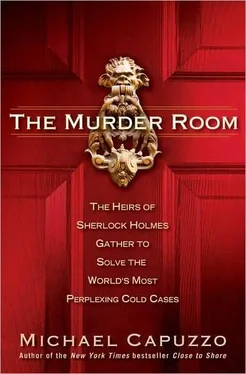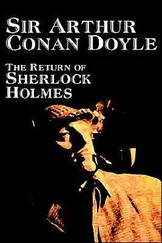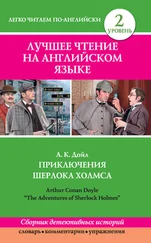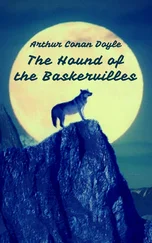“Remember, life is grand,” he told the students. “Life is wonderful!”
It wasn’t long before Bender was telling everyone he met that Walter had named the wrong suspect in the Manlius murder.
At the podium Fleisher called for quiet. It was time.
In past years, the Vidocq Society had also honored the famous forensic anthropologist William Bass, for founding “The Body Farm” at the University of Tennessee, which revolutionized the study of human decomposition; FBI special agent John S. Martin, America’s top Soviet spy catcher, who investigated the 1964 murders of three civil rights workers in Meridian, Mississippi; and Dr. Henry Lee, who investigated the JonBenet Ramsey and Laci Peterson murders, and O. J. Simpson’s alleged slayings of Nicole Brown Simpson and Ronald Goldman.
The first two winners this year were Vidocq Society stalwarts.
Philadelphia district attorney Lynn Abraham was known for unflinching toughness and integrity and her relentless pursuit of French fugitive killer Ira Einhorn. Haskell Askin, one of the nation’s top forensic dentists, had worked on a string of major cases from the Megan Kanka trial to the 9/11 terrorist attacks.
Abraham spoke movingly about her determination to become a lawyer after medicine, her first choice, was denied to her as a woman and a Jew. Askin, to the surprise of those who hadn’t seen him lately, had gone from a hearty man in the prime of a brilliant career to a frail, smiling, wistful man at the podium, shrunken by terminal cancer. Surrounded by family and friends, he thanked his VSM colleagues with courage and humor and the air of a noble farewell.
It was the first surprise in an evening of unexpected revelations.
Finally, Fleisher bestowed the Vidocq Society’s highest honor, the Halbert Fillinger Lifetime Achievement Award, reserved for an illustrious forensic investigator at the end of a long career.
The award went to Frank Bender.
Frank Bender thanked his late mentor, Hal Fillinger, for introducing him to corpse No. 5233 in the morgue thirty years ago. He said it was a shock to feel the cold gray flesh-“You know I like bodies warm.” He grinned, his silver incisor winking in the lights, and there was laughter.
The tuxedo couldn’t conceal Bender’s fit boxer’s body or sense of vigor. Sixty-eight years old, balding with a white goatee, he looked like a man at least a decade younger, the envy of younger men, capable of chasing muggers and drawing justice for years to come. His eyes gleamed with energy, like a bulb too bright for the fixture. He looked like a man women would always love.
He said he felt the great forensic pathologist was with him, watching him now. Fillinger had said, “Once you get bit by the forensic bug, you’re hooked forever. And he was right.” Looking back on his career, Bender loved being a part of the Vidocq Society because it gave him a feeling of camaraderie he had experienced only once before, in the Navy.
He wanted to do more with Vidocq; there weren’t enough cases that needed his art. He always wished he could do more.
He smiled again and thanked everybody, and the applause rang through the great hall. They were still cheering him when he sat down. He was Frank, a cad among moral men, a hero among mortals, the incarnation of the wild Vidocq, and they loved him. He could say anything to them.
Walter scowled. What had Bender-the same age as him-accomplished to deserve such crowning recognition? Others thought it was odd. It was strange hearing Frank look back fondly on his career when he was smack in the middle of it, fresh from one of his greatest cases, Colorado Jane Doe. Strange, too, when Fleisher introduced “my great friend Frank Bender” in an emotional speech that summed up their decades together, and then gave Frank a sloppy bear hug. No one burned with more passion for the work than Bender, the all-night iron horse. No one lived more in the moment and less in memory.
After the speech, Bender, Fleisher, and Walter walked together out onto the patio overlooking the river. The founders were joined by other men in tuxedos, with cigars and port, Cockburn’s Special Reserve, and women tippy in high heels and gowns with light throws. The autumn evening was unseasonably warm. They stood looking out at the river rolling by in darkness. Pushing the bank, it looked joined to the flat landscape, the rough stitching between two states.
Frank said, “I feel great right now. And it’s now that counts, right?” His smile, like his voice and his eyes, was electric, joyful.
His partners nodded. “Yeah, sure, Frank. It’s great.” They knew. Some others knew but Frank had not wanted to share it widely.
Frank Bender was dying.
Walter stared at Fleisher, who laughed nervously. “Yeah, it was a last-minute thing. We weren’t going to give Frank the award, but then we found out he’s dying. We gotta give it to him.”
Walter glared. Bender roared with laughter.
In recent days he’d learned that he had pleural mesothelioma, the cancer brought on by exposure to asbestos. The cancer was extremely rare, a thousand times rarer than lung cancer caused by heavy smoking. Only about one in a million people worldwide developed it. And it was deadly.
Mesothelioma took twenty to fifty years to develop after exposure. Bender was exposed to asbestos in the Navy, having fled the art establishment and an art college scholarship, knowing only that he didn’t want his art to hang only in museums. The Navy had offered to make him a photographer, but he refused. He wanted to work in the engine room, a mechanic like his dad, although he still couldn’t stop pencil-sketching the other mechanics. He spent three years in the late 1950s and early 1960s in the engine room of the destroyer escort U.S.S. Calcaterra, loving it. “I not only worked with asbestos,” he said, “I slept with it.”
The cancer filled his torso. “It’s bigger than a baby’s head,” the doctor said. The image made him feel bitterly miraculous, like he was giving birth to his own death. Radiation could ease the pain, but it wouldn’t save him. Chemotherapy could shut down his kidneys. “Surgery would be fatal,” Bender said, “because the cancer is already around my heart and lungs like a spiderweb. I have no options.”
Shaken, he had taken his partners into his confidence. He asked Fleisher to read the medical reports for him and give his impression. “It looks very grim, Frank,” Fleisher said sadly. Then Fleisher let out a small laugh.
“It’s just like you, Frank. There could be a movie on your life, and you kick the bucket. The big check comes, and you won’t be here to cash it.”
Bender laughed. They had been friends forever and Fleisher could do no wrong, ever. Bender loved life and he was going to keep at it. He wasn’t frightened. He was Frank.
The pain was very bad at night. The doctors gave him morphine, but he wouldn’t take it.
“Vodka and orange juice works much better,” he said. A screwdriver eased the hurt more smoothly, and it was still sexy. It was hard to pick up a woman after you did morphine.
“His biggest worry,” Fleisher told Walter, “is he still wants to have sex.”
Walter rolled his eyes. “Typical Frank.”
“I don’t think he has as much sex as he says he does,” Fleisher said. “I think he just likes to say it.”
Walter agreed. He didn’t even completely believe that Bender had cancer. The fact was, he hadn’t believed it when Bender had crowed to the media rooftops about the divine “miracle” of Jan’s cancer disappearing, and Jan’s cancer came back. Had it ever really gone? Or was Frank just addicted to getting his name in the paper, exposure that might mean work? It was a harsh thought, but in Walter’s world, such psychopathic deceptions and worse happened with every dawn. But deep down, Walter knew his cold reaction was largely a defense.
Читать дальше












